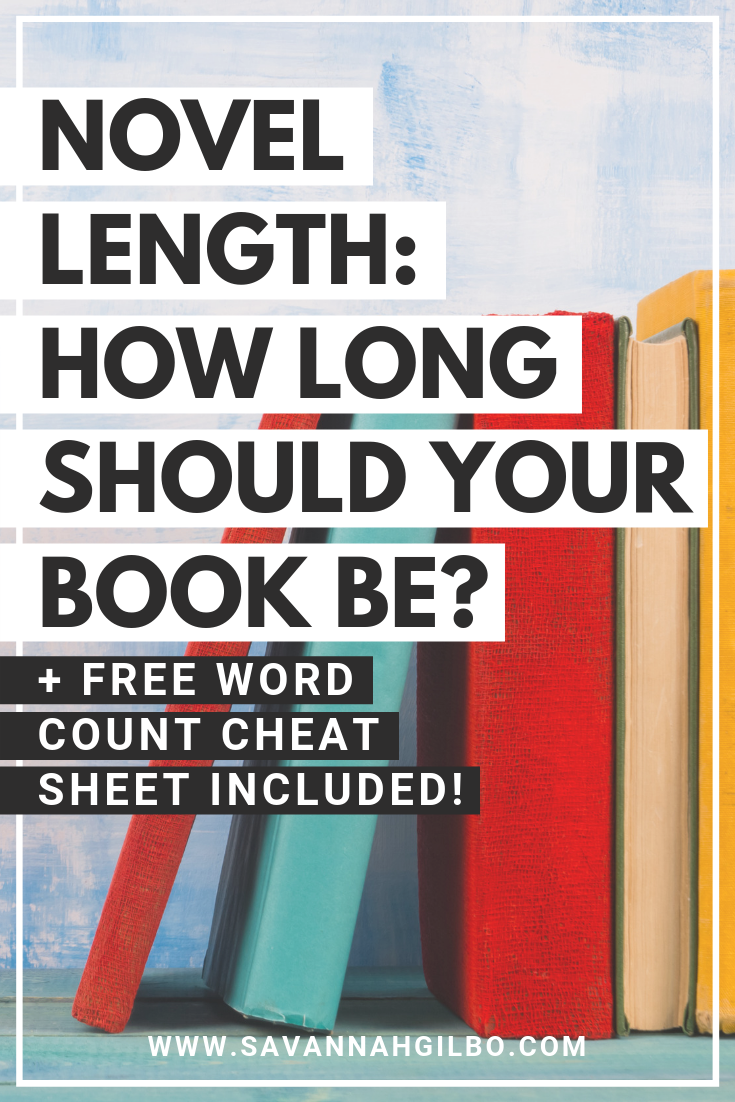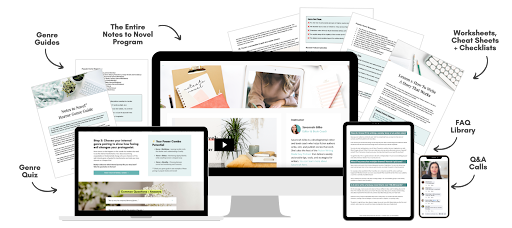Novel Length: How Long Should Your Book Be?

How many words are typically in a fantasy novel? What about a steamy romance? Or a nail-biting thriller?
When you’re starting a new writing project, how do you know how long your book should be?
And why does word count matter anyway? Is this really something you need to pay attention to?
These are common questions to ask, especially when you’re just starting out as a writer!
Believe it or not, your story’s word count matters in each and every stage of the book writing and publishing process.
In today’s post, we’re going to explore the average word count for each genre, as well as four reasons why having a target word count can be helpful to you and your writing project. But before we dive in, let’s start with the basics.
How many words make a novel?
A novel is defined as anything over 40,000 words.
The average novel is between 80,000-100,000 words.
Technically there’s no maximum length for a novel, but there are guidelines you can follow to determine whether your story is the appropriate length, or too long. These guidelines vary depending on the genre you're writing in, and the age range of your target audience.
For example, if a reader picks up a fantasy novel, they will have a certain expectation of what they’re about to read. Their expectations might include things like magic, a made-up world as well as the length of the book. They will also have expectations around the book-length. If your story is 125,000+ words, that might be totally fine. Readers of fantasy are happy to read longer novels as they know it will take time to immerse themselves in the fantasy world.
If, on the other hand, a reader picks up a mystery novel, they will expect things like; a crime early on in the story, clues and an investigation throughout, and a resolution where the perpetrator is either brought to justice or gets away with the crime. If your crime novel is 125,000+ words, your readers might not be willing to invest that much time or energy into your story when they’re used to reading other mystery novels that are closer to 80,000 words.
So, once you’ve committed to what genre you’re writing in, and what age group you’re writing for, you can use the average ranges below to determine your target word count.
Average Word Counts by Genre
Fiction:
- Fantasy: 90,000-125,000 words (though epic fantasy can go into the 180,000-200,000 word range)
- Romance: 50,000-90,000 words (depending on the sub-genre, mainstream romance novels are usually between 70,000-90,000 words)
- Science Fiction: 90,000-125,000 words
- Mysteries & Crime: 80,000-90,000 words
- Thrillers: 80,000-100,000 words
- Historical: 80,000-120,000 words
- Horror: 80,000-100,000 words
- Literary: 80,000-120,000 words
- Western: 50,000-80,000 words
Non-Fiction:
- Memoir & Biography: 80,000-100,000 words
- Narrative Non-Fiction: 70,000-110,000 words
- Self-Help and How-To: 40,000-60,000 words
Average Word Count by Age Group
- Adult: 80,000-125,000 words
- Young Adult: 50,000-90,000 words (this also varies depending on the genre, for example, YA fantasy tends to be closer to 80,000-100,000 words, while the other genres range from 50,000-70,000 words)
- Middle Grade: 30,000-50,000 words
- Children’s Books: 500-600 words (which equates to 1-2 lines per page, and about 30-32-pages)
Of course, there are always exceptions to guidelines like this, but for every successful exception, there are at least 100 failures. Staying within these guidelines will give you and your novel the best chance at success.
So, once you have a target word count in mind, let’s look at how that target word count can help you throughout the writing, editing, and publishing process.
4 Reasons Why You Should Have a Target Word Count for Your Story
Reason #1. Having a target word count can help you make a realistic writing schedule.
And this is important because, at one time or another, I think we’re all guilty of being a little unrealistic about what we can accomplish when it comes to our writing.
I know I’ve definitely been guilty of this -- like the one time I thought I could write an entire first draft in six months while working over forty hours a week and going through a serious bout of anxiety and depression. For me, that was not realistic, but I didn’t know any better so that was my goal, and long story short, it didn’t work out so well!
But this is where having a target word count comes in.
For example, let’s say you want to write an 80,000-word first draft and you know that you can realistically write 1,000 words per hour. That means you can estimate that it will take you 80 hours of time to write 80,000 words.
For another example, let’s say that you plan to write 500 words per day, four days a week. That means you can estimate that you’ll write 2,000 words a week and that your draft will take about 40 weeks to finish.
One thing that’s really important to note is that in both of my examples, I said how long it would take you to WRITE the first draft. That's not including time spent going back and editing old pages, or doing character sketches, or fleshing out your story’s world. So, if you don’t like to power through a draft without editing or doing any of these other things, make sure you plan in time for those, too.
As writers, we need to be realistic about how much we can actually get done in a day or a week. When we’re not realistic, we set ourselves up for disappointment when we ultimately fall short of our plan and our goals. Trust me, I’ve done that a few times it’s never fun. Now, I plan the opposite way, where I build in buffers for times when things don’t work out or for when I need to go back and edit some pages or whatever.
Reason #2. Having a target word count can help you outline your story.
And that’s because you can use your total word count goal to help you build a framework for your story’s acts, the number of scenes within each act, and then approximately where your key plot points should fall.
So for example, if you are writing a 100,000-word fantasy novel and following the Three Act Structure, you can break those 100,000 words into three chunks. Typically, the first act of your story will be about 25% of the whole while the middle will be 50% and the end will be another 25%. That means that:
- The first act will be about 25,000 words
- The second act will be about 50,000 words
- And the third act will be another 25,000 words
From there, you can even calculate approximately how many scenes will fit within each act of your novel. So for example, if you typically write scenes that are around 1,500 words, that means you will have about 16-17 scenes in the First Act of your novel.
(And the way I got that was by dividing the 25,000 words that make up act one by 1,500-word scenes. I like to explain that because math is NOT my strong suit and I’m sure some of you out there feel the same way.)
So, anyway, you can go one step further with this by calculating approximately where your plot points will fall within your story, too. So, for example, the global inciting incident usually happens around the 12% mark or halfway through act one. We know that act one is about 25,000 words based on our example from earlier so, we could estimate that our inciting incident will be somewhere around the 12,000-word mark.
Reason #3. Having a target word count will help you when it comes time to edit your work.
And that’s because every genre has a target word count range that you’ll be more or less expected to stay within.
Of course, there’s an exception to every rule, but for the most part, whether you’re self-publishing or traditional publishing, you’re going to want to stay within the ballpark of what readers and/or agents expect for a story of your genre.
So, let’s say that you’ve cranked out a whopping 120,000-word mystery novel and you’re ready to take the next steps. So, you do some research and find out that mysteries are usually closer to 80,000-90,000-words. This might seem like the end of the world, but trust me, it’s not. From there you can then calculate that you need to edit around 10,000-20,000 words to get your novel down closer to the average books in your genre.
From there, you can drill down into your story to figure out what to do next -- or what needs to be cut, moved, or combined in order to get closer to your target word count.
This will not only help you become more disciplined when it comes to self-editing, but it will also help you get in the habit of making every word count, too.
Reason #4. Having a target word count will help you on your path to publishing.
And that’s for a few reasons. First, if you choose to submit your manuscript to traditional publishers, you don’t want your manuscript to be immediately rejected for being either too short or too long.
Agents and the editors at publishing houses see many manuscripts cross their desks and the first part of your submission they read is your one-page synopsis in which you’ll include the word count of your story.
When you stick to the average word count of your genre, it shows that you’ve done your research and that you understand the market you’re trying to fit your story into. If you’re coming in way over (or way under) the average word count of your genre, this could mean the difference between your manuscript being read or not.
Now, if you choose to self-publish, I would still recommend following the word count guidelines of your genre because when your book is longer than average, editors and proofreaders may charge more to review your work.
Not only that, but if you plan to sell physical copies of your book, it will cost more to self-publish, and then you’ll be faced with the decision to charge the reader more or take a smaller profit margin on your book.
You also need to consider the readers' expectations here, too.
Using our example from earlier, if most mysteries are around 80,000 words and you self-publish one that’s 120,000 words, readers might not be ready or willing to dedicate that much time and energy to reading your book when they could almost use that time and energy to read two smaller books.
Of course, this depends on your genre, but it’s just something to think about.
Final Thoughts
Ultimately the length of your book is up to you as the writer.
You can have an 80,000-word story that doesn’t grab the reader’s attention, and the book will fail. Or, you can have a 160,000-word story that grabs the reader and doesn’t let them go, and the book will succeed.
Long story short, it’s not about how many words you have – it’s what those words do, that counts!
Recommended exercise: Pick up a few novels that are most like the book you want to write and note the word count. Use the average word count of these books, plus the list above, to plan the target word count for your own novel.
👉 Let's discuss in the comments: What kind of book are you writing? Are you an under-writer or an over-writer? Have you used these genre word count guidelines to plan and write your novel?



